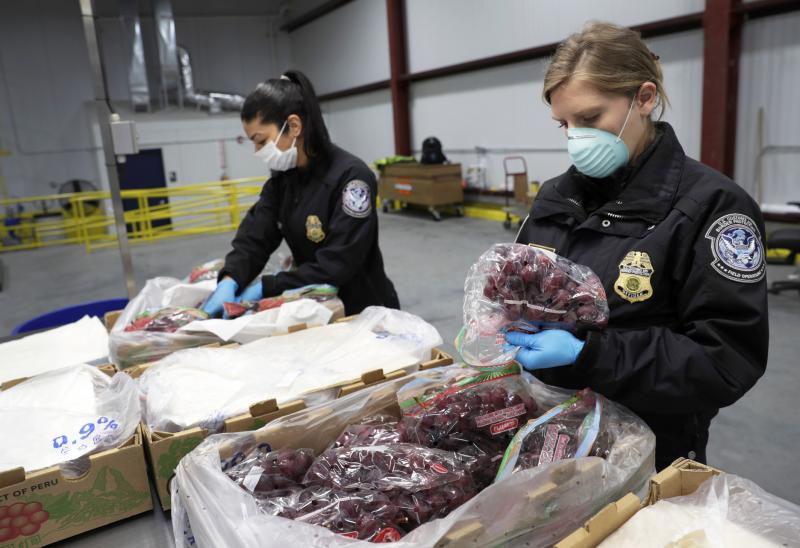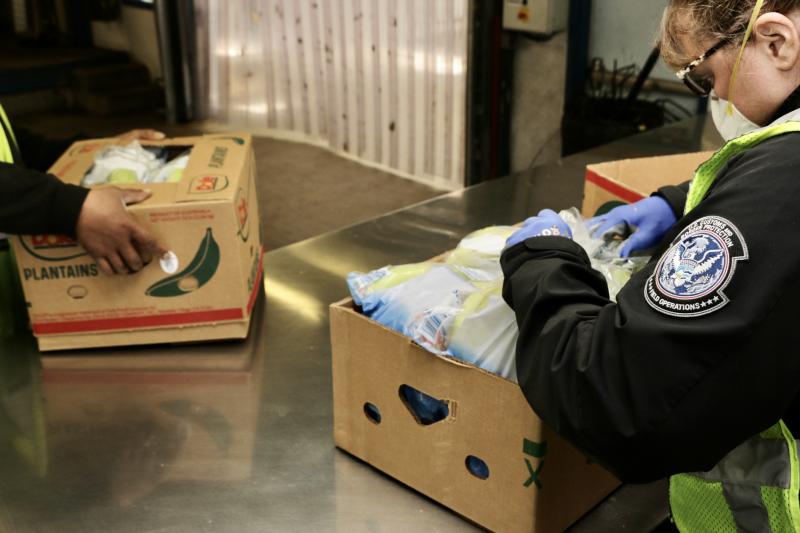Ports rank #1 in 17 produce products; #1 in imported beef.
PHILADELPHIA – U.S. Customs and Border Protection agriculture specialists in Philadelphia and Wilmington, Delaware, recently intercepted two destructive insect pests – an Ochrostomus sp. (Lygaeidae), commonly known as a seed bug, in a shipment of Brazilian grapes on October 5, and Diaphania sp., commonly known as a cucumber moth, in a shipment of Costa Rican pumpkins October 7, respectively.

imported grapes in Philadelphia.
CBP agriculture specialists arduously inspect tons, literally tons, of imported commodities aboard aircraft and cargo ships, and in baggage carried by passengers on international flights.
It is a daunting task, but a necessary one. CBP agriculture specialists conduct these inspections to ensure that the food on your table is safe for consumption, and to protect our nation’s agricultural resources from invasive insect pests, plant and animal diseases, and invasive weeds that could choke out our crop industries and impact our nation’s economic vitality.
About that seed bug mentioned earlier, a U.S Department of Agriculture (USDA) entomologist identified it as a first-in-port discovery in the Delaware Valley – a new local pest threat.
So, CBP’s agriculture protection mission is important to the Delaware Valley economy when you consider that seaports along the Delaware River and Bay are among the busiest produce import ports in all of North America.
Seaport facilities in in Pennsylvania, Delaware and New Jersey rank #1 for imported produce for 17 produce products, including popular fruits and vegetables such as apples, avocadoes, bananas, grapes, lemons, oranges and pineapples from Central and South America. Additionally, these seaports import dozens of other produce products, including October’s favorite fruit – pumpkins. Collectively, CBP agriculture specialists clear more than 2.5 million tons of perishable goods worth about $5 billion.
Seaports in CBP’s Area Port of Philadelphia are also the nation’s leader in beef imports from Australia and New Zealand to the tune of 290 million kilograms a year worth about $1.7 billion.

imported plantains in Wilmington, Del.
Annually, CBP agriculture specialists in the Port of Philadelphia and Wilmington reviewed documents for over 71,000 agriculture shipments while inspecting an additional 26,000 shipments to ensure that the commodities are free from pests, contaminants, and pathogens. During fiscal year 2020, they cleared more regulated agriculture cargo than any other CBP seaport Port of Entry – more than twice that of the next busiest seaport at the Port of Fort Everglades, Florida (about 97,000 compared to about 46,000).
One accommodation that makes the Delaware Valley seaports attractive to perishables importers is intermodal access. Food and other critical resources arriving at local seaport facilities can be on a truck or railcar and reach the Mid-Atlantic population of 60 million people in a matter of hours – and reach almost a third of the U.S. population in under a day. These agriculture commodities are destined to markets and tables all across the United States.
“Customs and Border Protection agriculture specialists are on the frontline against the extraordinary threat posed by invasive insects and highly pathogenic animal and plant diseases that threaten our economic security,” said Casey Durst, Director of Field Operations for CBP’s Baltimore Field Office. “Our agriculture specialists in the Baltimore Field Office inspect hundreds of millions of pounds of fruit, vegetables, and meats a year to ensure they are fit for our tables and will not harm America’s agriculture.”
According to the U.S. Department of Agriculture (USDA), agriculture is the largest industry and employment sector in the United States, with more than $1 trillion in annual economic activity.
The potential impact of a pest introduced into the United States can be catastrophic. For example, invasive species cause $138 billion annually in economic and environmental losses in the United States, including yield and quality losses for America’s agriculture industry.
To combat the threats posed by invasive insects and weeds, CBP collaborates extensively with industry partners, such as the USDA, the Food and Drug Administration, importers, shippers, terminal operators, shipping lines, and customs brokers to implement innovative mitigation strategies that improve import efficiency while enhancing safeguarding measures.
For example, CBP agriculture specialists in the Ports of Philadelphia and Wilmington collaborated with the USDA and implemented risk-based sampling of some imported produce to focus on inspecting higher-threat agricultural commodities and expediting the release of compliant shipments to the U.S. marketplace quicker.
CBP agriculture specialists have extensive training and experience in the biological sciences and agricultural inspection; inspect tens of thousands of international air passengers, and air and sea cargoes nationally imported to the United States.
During a typical day last year, CBP agriculture specialists across the nation seized 4,695 prohibited plants, meats, animal byproducts, and soil, and intercepted 314 insect pests at U.S. ports of entry. See what else CBP achieved on a typical day during 2019.
Please visit CBP Ports of Entry to learn more about how CBP’s Office of Field Operations secures our nation’s borders.

